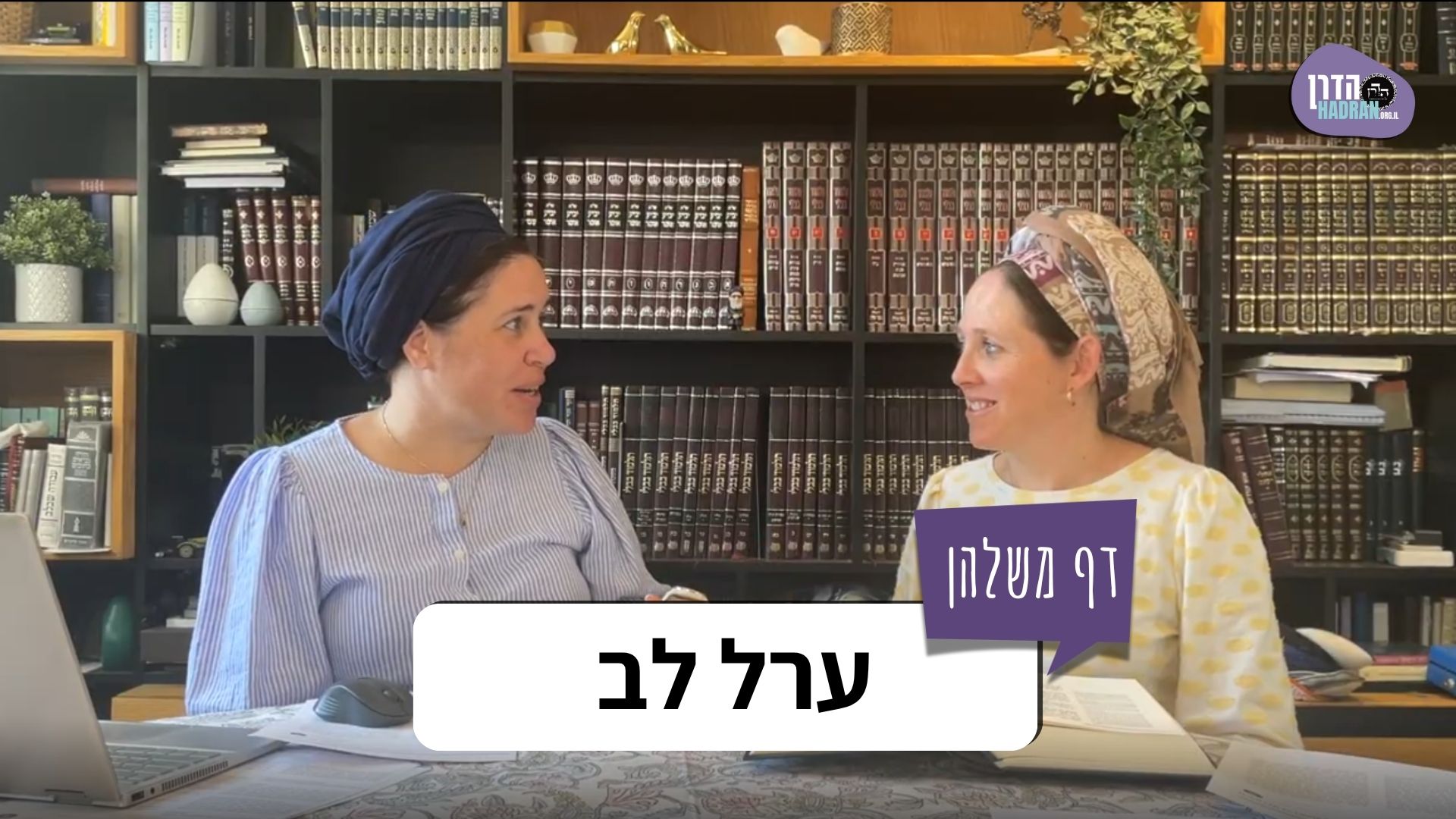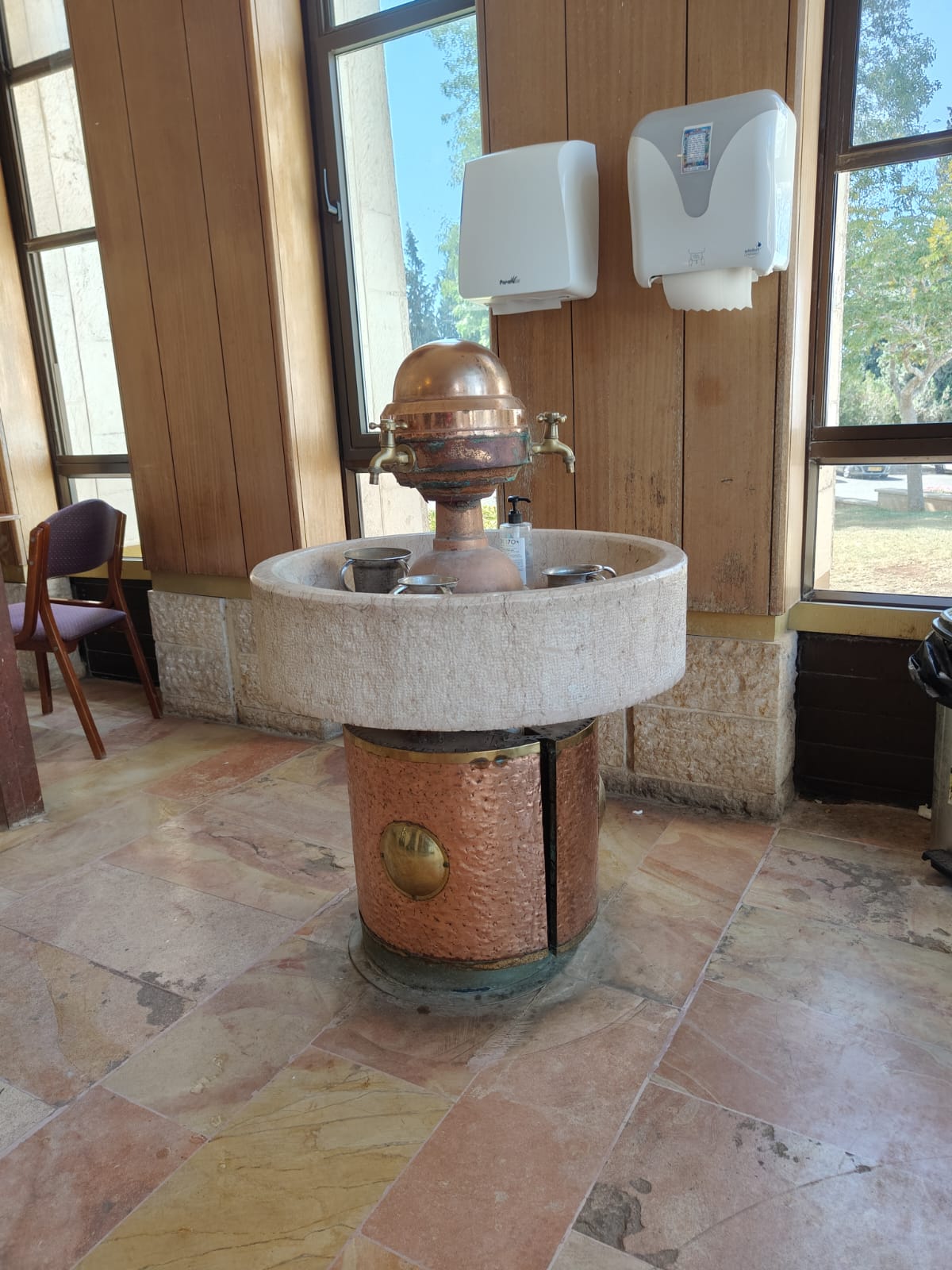Study Guide Nazir26
Nazir 26
Share this shiur:
Want to dedicate learning? Get started here:
Delve Deeper
Broaden your understanding of the topics on this daf with classes and podcasts from top women Talmud scholars.
New to Talmud?
Check out our resources designed to help you navigate a page of Talmud – and study at the pace, level and style that fits you.
The Hadran Women’s Tapestry
Meet the diverse women learning Gemara at Hadran and hear their stories.
Nazir 26
שֶׁהִפְרִישׁוּ מָעוֹת לְקִינֵּיהֶם, רָצָה לְהָבִיא בָּהֶן חַטַּאת בְּהֵמָה — יָבִיא, עוֹלַת בְּהֵמָה — יָבִיא. מֵת וְהָיוּ לוֹ מָעוֹת סְתוּמִין — יִפְּלוּ לִנְדָבָה!
who separated money for their nests and then became wealthy, if the owner wishes to change their designation and to bring an animal sin-offering with them, he may bring a sin-offering with them. If he wishes to use them to buy an animal burnt-offering he may bring it, supplementing the required amount with other money. If the owner died and he had unallocated funds, they all will be allocated for communal gift offerings, including the value of the sin-offering. This shows that the halakha that unallocated funds are used for gift offerings applies in cases other than that of a nazirite.
תַּנָּא נָזִיר וְחַיָּיבֵי קִינִּין דְּדָמוּ לֵיהּ, וּלְאַפּוֹקֵי מֵהָא דְּתַנְיָא: מִי שֶׁהָיָה מְחוּיָּיב חַטָּאת, וְאָמַר: ״הֲרֵי עָלַי עוֹלָה״, וְהִפְרִישׁ מָעוֹת וְאָמַר ״הֲרֵי אֵלּוּ לְחוֹבָתִי״,
The Gemara answers: He taught the case of a nazirite and also the case of those obligated to bring nests, which is similar to that of a nazirite and is therefore treated identically with regard to its halakha. This serves to exclude that case which is taught in a baraita. The situation discussed in the baraita involves one who was obligated to bring a sin-offering for a transgression he committed, and he also said: It is incumbent upon me to bring a gift burnt-offering, and he separated money and said: These are hereby for my obligatory offering. Since he might have meant either his obligation of the sin-offering or his burnt-offering for the new vow, the question arises as to what should be done with the money.
רָצָה לְהָבִיא בָּהֶן חַטַּאת בְּהֵמָה — לֹא יָבִיא. עוֹלַת בְּהֵמָה — לֹא יָבִיא. מֵת וְהָיוּ לוֹ מָעוֹת סְתוּמִים — יֵלְכוּ לְיָם הַמֶּלַח.
The baraita explains that if he wishes to bring an animal sin-offering with it, he may not bring one; if he wishes to use it to purchase an animal burnt-offering, he may not bring it either. If he died and had unallocated funds, one must take them and cast them into the Dead Sea. Since the two offerings are not part of the same obligation, the unallocated funds may not be used for gift offerings.
אָמַר רַב אָשֵׁי: הָא דְּאָמְרַתְּ מְפוֹרָשִׁין לָא — לָא תֵּימָא דְּאָמַר ״אֵלּוּ לְחַטָּאתִי, וְאֵלּוּ לְעוֹלָתִי, וְאֵלּוּ לִשְׁלָמַי״. אֶלָּא אֲפִילּוּ אָמַר ״אֵלּוּ לְחַטָּאתִי וּלְעוֹלָתִי וְלִשְׁלָמַי״ — מְפוֹרָשִׁין הֵן.
§ Rav Ashi said: That which you said with regard to a nazirite who had allocated money, that he may not use it all for gift offerings because the value of the sin-offering must be taken and cast into the Dead Sea, do not say that this is referring only to a case where he explicitly said: These are for my sin-offering, and these are for my burnt-offering, and these are for my peace-offering, each one separately. Rather, even if he said: These are for my sin-offering and for my burnt-offering and for my peace-offering, they are considered allocated for the purposes of this halakha, despite the fact that he did not designate the money for particular offerings.
וְאִיכָּא דְּאָמְרִי, אָמַר רַב אָשֵׁי: לָא תֵּימָא עַד דְּאָמַר ״אֵלּוּ לְחַטָּאתִי וּלְעוֹלָתִי וְלִשְׁלָמַי״, אֶלָּא אֲפִילּוּ אָמַר: ״אֵלּוּ לְחוֹבָתִי״ — הֲרֵי הֵן כִּמְפוֹרָשִׁין.
And some say a different version of this statement. Rav Ashi said: Do not say they are deemed allocated only if he says: These are for my sin-offering and for my burnt-offering and for my peace-offering; rather, even if he said it in broader terms: These are for my obligation, they are considered as allocated.
אָמַר רָבָא: הָא דַּאֲמַרַן מָעוֹת סְתוּמִין יִפְּלוּ לִנְדָבָה, אִם נָפְלָה דְּמֵי חַטָּאת מִבֵּינֵיהֶן — הֲרֵי הֵן כִּמְפוֹרָשִׁין.
§ Rava said: That which we said, that if one had unallocated funds they will be allocated for communal gift offerings, applies only if the money for all of the offerings was mixed together. However, if the money for the sin-offering fell and was separated from the others, all the remaining money is now considered as allocated. This means that instead of the entire sum being used for a gift burnt-offering, part of it is used for a peace-offering, which is eaten for one day and does not require bread.
תַּנְיָא כְּווֹתֵיהּ דְּרָבָא: ״אֵלּוּ לְחַטָּאתִי וְהַשְּׁאָר לִשְׁאָר נְזִירוּתִי״, דְּמֵי חַטָּאת — יֵלְכוּ לְיָם הַמֶּלַח, וְהַשְּׁאָר — יָבִיא חֶצְיוֹ לְעוֹלָה וְחֶצְיוֹ לִשְׁלָמִים. וּמוֹעֲלִין בְּכוּלָּן, וְאֵין מוֹעֲלִין בְּמִקְצָתָן.
The Gemara notes that it is taught in a baraita in accordance with the opinion of Rava: If one said: This money is for my sin-offering and the rest is for the rest of my obligations of naziriteship, and he died, the money for the sin-offering is taken and cast into the Dead Sea, and as for the rest, he brings a burnt-offering with half of it, and half of it goes for a peace-offering. And one who benefits from all of it is liable for misuse of consecrated property, due to the value of a burnt-offering that is included in the money. But one is not liable for misuse of consecrated property if he benefits from some of the money, as the money he took is possibly that of the peace-offering, to which the prohibition against misuse does not apply.
״אֵלּוּ לְעוֹלָתִי וְהַשְּׁאָר לִשְׁאָר נְזִירוּתִי״, דְּמֵי עוֹלָה — יָבִיאוּ עוֹלָה, וּמוֹעֲלִין בָּהֶן. וְהַשְּׁאָר יִפְּלוּ לִנְדָבָה, וּמוֹעֲלִין בְּכוּלָּן, וְאֵין מוֹעֲלִין בְּמִקְצָתָן.
If one said: This money is for my burnt-offering and the rest is for the rest of my obligations of naziriteship, the money for the burnt-offering goes for a burnt-offering, and one who benefits from it is liable for misuse of consecrated property. And the rest is allocated for communal gift offerings, as the sum includes the value of a sin-offering. And one who benefits from all of it is liable for misuse of consecrated property, due to the value of a sin-offering included in it, but one is not liable for misuse of consecrated property if he benefits from some of the money, as he might have taken the money for a peace-offering, as stated above.
אָמַר רַב הוּנָא אָמַר רַב: לֹא שָׁנוּ אֶלָּא מָעוֹת, אֲבָל בְּהֵמָה — הֲרֵי הִיא כִּמְפוֹרֶשֶׁת.
§ Rav Huna said that Rav said: They taught only that there is a difference between unallocated and allocated money of a nazirite with regard to money designated for the purchase of offerings. However, if one designated an animal it is treated as allocated. A nazirite is obligated to bring three types of animals, a female sheep for a sin-offering, a male sheep for a burnt-offering, and a ram in its second year for a peace-offering. It is therefore evident which offering he had in mind when designating a particular animal. Consequently, if the owner died each offering is treated in the appropriate manner: The sin-offering must be left to die, like all sin-offerings whose owners have died; the burnt-offering is sacrificed as a burnt-offering; and the peace-offering is brought as a peace-offering, although it must be eaten in one day and does not require bread.
אָמַר רַב נַחְמָן: הָא דְּאָמְרִי בְּהֵמָה הֲרֵי הִיא כִּמְפוֹרֶשֶׁת, לֹא שָׁנוּ אֶלָּא תְּמִימָה, אֲבָל בַּעֲלַת מוּם — הֲרֵי הִיא כִּסְתוּמָה. אֲבָל נְסָכָא — לָא.
Rav Naḥman said: When they say that if one designates an animal it is considered as allocated, they taught this only if it is unblemished and is fit to be sacrificed itself. However, if one separated a blemished animal, even if he set aside the three required types, a female sheep, a male sheep, and a ram in its second year, each one is considered as unallocated. This is because one will not sacrifice the animals themselves but will sell them and use the money. However, this is not the case with regard to a bar of silver [naskha]. If one separated three silver bars they are considered allocated, as each is a distinct item, designated for a particular offering.
וְרַב נַחְמָן בַּר יִצְחָק אָמַר: אֲפִילּוּ נְסָכָא, אֲבָל סְוָאר שֶׁל קוֹרוֹת — לָא. אֲמַר לֵיהּ רַב שִׁימִי בַּר אָשֵׁי לְרַב פָּפָּא: מַאי טַעְמַיְיהוּ דְּרַבָּנַן — דְּאָמְרִי: מָעוֹת, וְלֹא בְּהֵמָה וְלָא נְסָכָא, מָעוֹת וְלָא סְווֹרָא? אֶלָּא מֵעַתָּה: מָעוֹת וְלֹא עוֹפוֹת!
And Rav Naḥman bar Yitzḥak said: Even a silver bar is considered unallocated; however, a pile [sevar] of beams is not. If he set aside three piles of construction beams for his offerings, they are treated as allocated money. Rav Shimi bar Ashi said to Rav Pappa: What is the reasoning of the Rabbis, i.e., Rav, Rav Naḥman, and Rav Naḥman bar Yitzḥak, who say: Money and not an animal, and not a silver bar; and similarly, money and not a pile? Do they maintain that the halakha of unallocated funds applies only to money and not to other items? However, if that is so, one should likewise say that it applies to money and not birds.
וְכִי תֵּימָא הָכִי נָמֵי, אֶלָּא הָא דְּאָמַר רַב חִסְדָּא: אֵין הַקִּינִּין מִתְפָּרְשׁוֹת, אֶלָּא אִי בִּלְקִיחַת בְּעָלִים, אִי בַּעֲשִׂיַּית כֹּהֵן.
And if you would say: So too, this is in fact the case, and birds cannot be considered allocated, but what about this statement that Rav Ḥisda said: Nests, i.e., a pair of turtle doves or pigeons, one for a burnt-offering and the other for a sin-offering, are considered allocated only by either the acquisition of the owner, if the owner designates each bird for a particular offering upon their purchase, or by the actions of the priest who decides which bird is for which offering when he sacrifices them. This clearly indicates that the birds are considered unallocated beforehand.
אַמַּאי? הָא מָעוֹת גְּמִירִין לָהּ!
Therefore, the question arises: Why is this so? Didn’t we learn this halakha only with regard to money, whereas Rav Ḥisda’s statement indicates that birds are also considered unallocated? If Rav Ḥisda’s opinion is accepted, the same halakhot should also apply to animals, bars, and piles of beams.



































